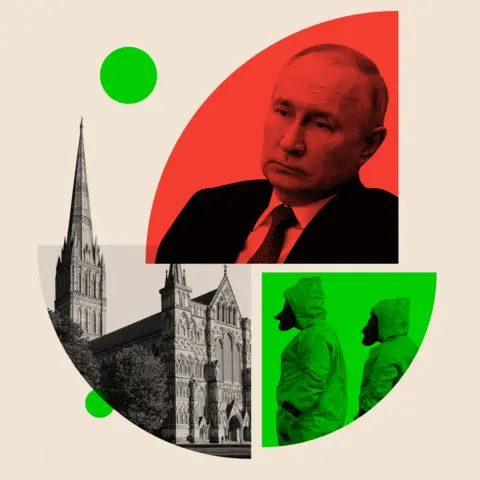 BBCThe family of Dawn Sturgess, who died six years ago after coming into contact with Novichok, have been calling on Vladimir Putin to speak to the inquiry after her death in the Salisbury poisonings.
BBCThe family of Dawn Sturgess, who died six years ago after coming into contact with Novichok, have been calling on Vladimir Putin to speak to the inquiry after her death in the Salisbury poisonings.
I put their request directly to Andrei Kelin, the Russian ambassador to the UK, in as part of a wide-ranging sit-down interview that will be broadcast on Sunday.
“I hardly believe President Putin will go to Britain just to testify something,” he said.
The UK government holds Russia, and two Russian agents, known as Alexander Petrov and Ruslan Boshirov, responsible for the attack.
Andrei Kelin questioned the need for an inquiry. “Why drag this history so long?”
He also rejected suggestions Petrov or Borishov should attend, saying the men had already given answers on TV – referring to a 2018 interview they gave on Russian state TV in which they claimed they had just been visiting Salisbury Cathedral.
That claim was mocked by some in Russia. UK officials called the interview “risible”.
Challenged with the fact that the UK, US, France, Germany, Canada all believe the attack was carried out by Russia with Novichok manufactured in Russia, Kelin said that “too many governments” were involved and dismissed their allegation as “nonsense“.
Pressed to give a response to the Sturgess family, the ambassador appeared to laugh, saying: “I have never met this family … If someone has died, of course we are concerned about that.”
Watch: Highlights from Laura Kuenssberg's interview with Andrei KelinOn Ukraine, Kelin accused the UK of “waging war” on Russia by supporting the country with weapons and resources. If Zelensky “won’t negotiate with us, fine”, he said. “He will lose more and more terrain.”
This week, the Ukrainian president published a so-called victory plan to try to bring the conflict to an end next year.
It includes a formal request to join Nato and the lifting of bans on long-range strikes with Western-supplied weapons deep into Russia.
Challenged on Russia’s illegal invasion and stalemate in the war, the ambassador said Zelensky “does not want peace … he continues to ask for more and more; Nato, EU assistance, defence packages.
“Anything, but nothing about negotiations at all.”
Kyiv, backed by its allies, has always rejected any suggestions of negotiation after the Russian invasion. They believe that would mean the permanent loss of Ukrainian territory.
Western governments believe that Putin is under rising pressure at home, with increasing casualties and the huge cost of the war. Even Moscow’s finance ministry has acknowledged the intense strain on the economy.
But Kelin claims Russia is living “absolutely normal life”.
Asked if the suffering on both sides kept him awake at night, he said: “No one likes the war." He said it could stop if the West stopped supplying arms to Ukraine.
“We are not just going to say, OK, [from] tomorrow we do not shoot each other. We won’t.”
On Friday, Keir Starmer reiterated his support for Ukraine. “We have always said that it is for the Ukrainian people to decide their own future so we’re clear, together with President Zelensky, that the only acceptable outcome is a sovereign Ukraine and a just peace.”
He also said Russia was getting weaker, with the war soaking up 40% of its budget, and the government believing there were more than 600,000 dead or wounded Russians, and another 500,000 casualties predicted by the end of the year.
